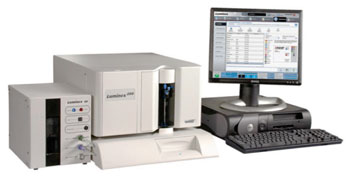Blood Test Predicts Onset of Alzheimer's Disease
By LabMedica International staff writers
Posted on 22 Jul 2014
A combination of 10 proteins could predict whether individuals would progress from mild cognitive impairment to Alzheimer's disease (AD) within a year has been discovered. Posted on 22 Jul 2014
Mild cognitive impairment (MCI) which includes problems with day-to-day memory, attention and language can be an early sign of dementia, but it can also be a symptom of stress or anxiety. About 10% of people with MCI go on to develop dementia within a year, however, apart from regular memory tests, there is currently no reliable way to predict who will and will not be among them.

Image: The Luminex 200 System for Multiplex Testing (Photo courtesy of the University of Utah).
Scientists at King's College London (UK) working with Proteome Sciences plc (Cobham, UK) analyzed blood samples from 1,148 subjects: 476 with AD, 220 with MCI, and 452 elderly controls with no dementia. The team analyzed 26 proteins in the blood samples and found that 16 linked strongly to brain shrinkage in the MCI and Alzheimer's groups. All candidate proteins were measured using xMAP multiplex bead assays incorporated in 7 MILLIPLEX MAP panels run on the Luminex 200 instrument (Luminex; Austin, TX, USA).
In a secondary analysis they discovered that a combination of 10 proteins could predict whether individuals would progress from MCI to Alzheimer's disease within a year with an accuracy of 87%. They found that the proteins transthyretin (TTR), clusterin, cystatin C, alpha-1-acid glycoprotein (A1AcidG), Intercellular Adhesion Molecule 1 (ICAM1), cytochrome c4 precursor (CC4), pigment epithelium-derived factor (PEDF), alpha 1-antitrypsin (A1AT), Chemokine ligand 5 (RANTES), and Apolipoprotein C-III (ApoC3) plus the Apolipoprotein E (APOE) genotype, had the greatest predictive power.
Abdul Hye, PhD, the lead author of the study said, “The study marks the end of many years' work to find which of the thousands of proteins in the blood were clinically relevant. We now have a set of 10 proteins that can predict whether someone with early symptoms of memory loss, or mild cognitive impairment will develop Alzheimer's disease within a year, with a high level of accuracy.” The study was published on July 10, 2014, in the journal Alzheimer's and Dementia.
Related Links:
King's College London
Proteome Sciences plc
Luminex













